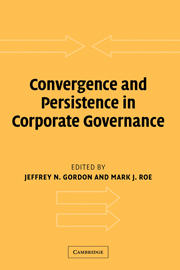Book contents
- Frontmatter
- Contents
- List of figures
- List of tables
- List of contributors
- Acknowledgments
- Introduction
- PART I Systemic issues
- PART II Government players
- 5 The international relations wedge in the corporate convergence debate
- 6 Property rights in firms
- 7 Modern politics and ownership separation
- PART III Specific institutions
- Index
7 - Modern politics and ownership separation
Published online by Cambridge University Press: 04 March 2010
- Frontmatter
- Contents
- List of figures
- List of tables
- List of contributors
- Acknowledgments
- Introduction
- PART I Systemic issues
- PART II Government players
- 5 The international relations wedge in the corporate convergence debate
- 6 Property rights in firms
- 7 Modern politics and ownership separation
- PART III Specific institutions
- Index
Summary
Introduction: why do only some nations have public firms?
The public firm, with dispersed stockholders in deep liquid securities markets, dominates business in the United States. Despite its pervasiveness, it has well-known infirmities, namely in the fragile ties that bind managers to shareholders. If shareholders strongly fear managers' disloyalty or incompetence, they will invest warily; if sufficiently fearful, they will not invest at all, and other ownership structures will prevail. But the core problems of binding managers to shareholders in the United States have shrunk to acceptable levels; investors are not so afraid of managers that they refuse to invest. Indeed, these problems have been handled so well that we fail to recognize the political prerequisites to resolving them and tying American managers to dispersed stockholders.
I argue here that the core problems of the public firm cannot be resolved readily, or at all, in a strong social democracy. Social democracies press managers to “defect” from loyalty to shareholders and make it harder to align managers with shareholders. When we see how social democracies weaken shareholders' ties to managers, we shall thereby discover a key political prerequisite to the rise and persistence of the public firm in the United States, namely the absence of a social democracy and its concomitant powerful pressures on the business firm.
In contrast to the American-style public firm, the family firm, or the public firm with concentrated ownership, has dominated business in France, Germany, Italy, and Scandinavia.
- Type
- Chapter
- Information
- Convergence and Persistence in Corporate Governance , pp. 252 - 290Publisher: Cambridge University PressPrint publication year: 2004
- 4
- Cited by



